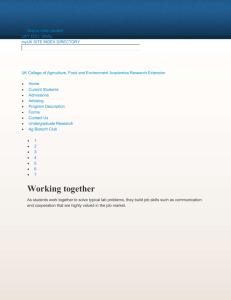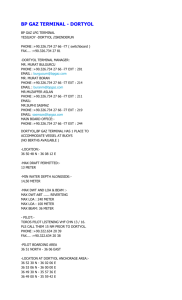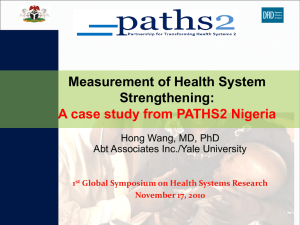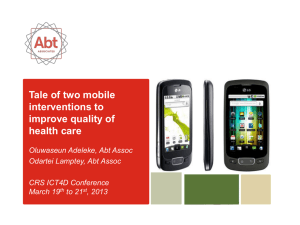ABT COURSE LEVEL OUTCOMES 1
advertisement
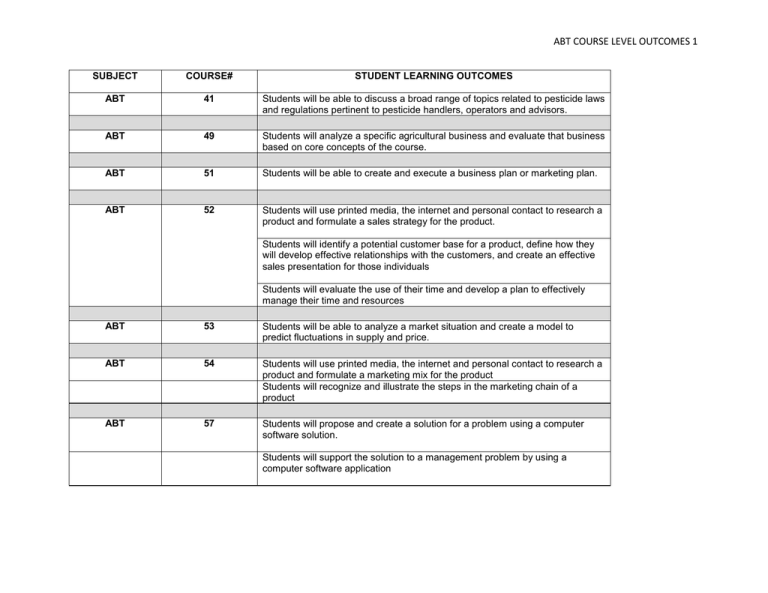
ABT COURSE LEVEL OUTCOMES 1 SUBJECT COURSE# STUDENT LEARNING OUTCOMES ABT 41 Students will be able to discuss a broad range of topics related to pesticide laws and regulations pertinent to pesticide handlers, operators and advisors. ABT 49 Students will analyze a specific agricultural business and evaluate that business based on core concepts of the course. ABT 51 Students will be able to create and execute a business plan or marketing plan. ABT 52 Students will use printed media, the internet and personal contact to research a product and formulate a sales strategy for the product. Students will identify a potential customer base for a product, define how they will develop effective relationships with the customers, and create an effective sales presentation for those individuals Students will evaluate the use of their time and develop a plan to effectively manage their time and resources ABT 53 Students will be able to analyze a market situation and create a model to predict fluctuations in supply and price. ABT 54 Students will use printed media, the internet and personal contact to research a product and formulate a marketing mix for the product Students will recognize and illustrate the steps in the marketing chain of a product ABT 57 Students will propose and create a solution for a problem using a computer software solution. Students will support the solution to a management problem by using a computer software application ABT COURSE LEVEL OUTCOMES 2 Students will use critical thinking and a technical skill to produce a computerized business document that (1) stores collected data in an organized manner, and (2) analyzes the data to assist with a relevant business decision (e.g. Excel assignment in statistical functions). ABT 58 Students will be able to discuss how a comprehensive safety plan can be a benefit to an agricultural business. Students will research a topic where they become well versed in an area of agricultural law or regulation . Students will be able to discuss how a comprehensive safety plan can be a benefit to an agricultural business. Students will research a topic where they become well versed in an area of agricultural law or regulation. ABT 66 This is CSS 66 and not a current ABT course. It is cross-listed as ABT-66 in the catalog. ABT 67 This course does not exist. It may have originated from a typo in the catalog under AIT-67. ABT 81 Students will identify insects from the insect orders of most significance to the local agriculture industry. Students will select and evaluate methods and timing of control measures for critical pests. Students will identify insects from the insect orders of most significance to the local agriculture industry. Students will select and evaluate methods and timing of control measures for critical pests. ABT 82 Students will identify weed species of most significance to the local agriculture industry. ABT COURSE LEVEL OUTCOMES 3 Students will select and evaluate methods and timing of control measures for critical weeds. ABT 83 Student will be able to identify important fungal, bacterial and viral diseases in California agriculture. ABT 90 Students will analyze soils for their physical and chemical properties, and determine appropriate actions to take based on these data. ABT 92 Students will create a collection of pressed and dried plants as a class project. Students will learn to identify, compare and contrast important crop and weed species in the Monterey County region. Students will be able to evaluate the biological properties, lifecycles, and environmental adaptations for many of the important crop and weed species in California, especially in Monterey County. ABT 93 Students will create a model cold chain and critique the effectiveness of the process. Students will identify the strengths and weaknesses of post-harvest handling operations. ABT 94 Students will be able to develop a plan and successfully grow a living crop of vegetables or ornamental plants. ABT 96 Students will develop a two year vegetable cropping plan for a specified acreage Students will use learned skills to plan for implementation all the steps necessary to grow a vegetable crop in a commercial sized acreage ABT 97 Students will develop a yearly calendar of operations for the management activities of a vineyard Students will apply principles learned by developing a strategy to increase efficiency and/or yield from a vineyard ABT COURSE LEVEL OUTCOMES 4 ABT 98 Students will be able to discuss how a comprehensive fertilizer program is developed for a Salinas Valley vegetable crop Students will calculate the cost of a fertilizer program and make recommendations regarding alternatives ABT 99 Students will produce a resume with their current skills, education and experience. ABT 101 Students will describe the structure and function of the marketing of organic products. ABT 102 Students should be able to describe and apply the elements of a cultural program for organic vegetable production. ABT 103 Students should be able to create a written whole farm plan that is sufficiently detailed to guide the operation of a small farm. ABT 104 Students will diagram and differentiate between the types of business organization appropriate for organic farming operations. ABT 105 Students will develop a marketing plan for their organic farming business. ABT 110 Students will create a complete professional portfolio ABT 130 Gather and evaluate information and compose an original paper on a current, relevant topic related to food safety. ABT 131 Given a food borne illness hazard situation, the students will evaluate the conditions, propose a solution and write standard operating procedures to prevent reoccurrence. ABT 132 Students will evaluate a field situation, in a field or processing facility, propose and document steps in a risk reduction plan. ABT COURSE LEVEL OUTCOMES 5 ABT 133 Students will employ accepted good manufacturing practices in the evaluation of a food processing facility. ABT 134 Students will evaluate a site and develop an inventory of potential environmental sources of food borne pathogens and propose mitigating practices. ABT 135 Given any microbe, the student will be able to categorize the microbe with respect to growth characteristics and environmental niche. ABT 160 Students will analyze their interests and talents and develop effective short, medium and long term goals. Students will describe the areas of specialization in agriculture and explain some of the future trends in that area. ABT 258 Students will develop leadership skill by creating informational materials and making presentations to high school students.

